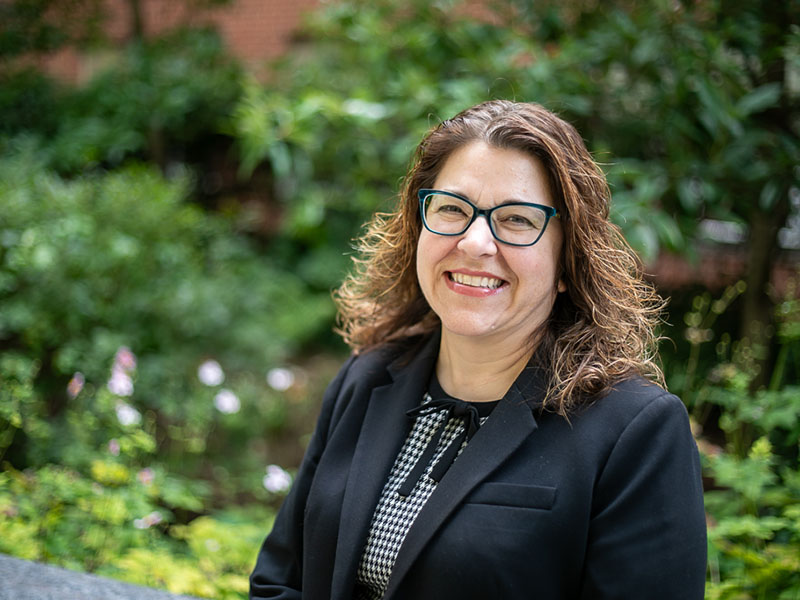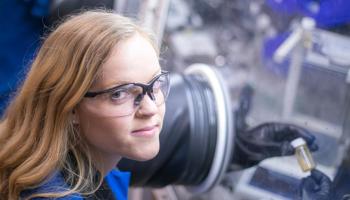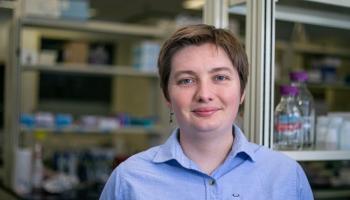Negotiating Grad School’s “Hidden Curriculum”

Earning a graduate degree is hard enough, but it may not be a ticket to the career of your dreams if you don’t also master the “hidden curriculum,” the often unwritten and unofficial lessons that students need to learn to make the most of their graduate educations. For generations, graduate students and postdocs had to rely on their peers and their own luck and ingenuity to learn those lessons, but UVA’s innovative Office of Graduate and Postdoctoral Affairs, offers students in the Graduate School of Arts & Sciences a better alternative through its PhD Plus program designed to ensure that UVA’s students get the most out of their graduate school and postdoctoral experiences.
Melanie Sinche, the Office of Graduate and Postdoctoral Affairs’ incoming director of career and professional development, spoke with the A&S Office of Communications at the start of the semester about the seven things grad students and postdocs need to do to prepare themselves for life during and after their advanced training. The author of Next Gen PhD: A Guide to Career Paths in Science, a book offering new insights into today’s job market for scientists both inside and outside of academia and the skills needed to make a successful transition into a post-graduate career, Sinche is a nationally recognized leader in career development for graduate students and postdocs in any field of study.

Learn to Navigate University Culture
For most undergraduates, a professor is a professor, but by the time you get to graduate school or beyond, it’s important to understand the bigger picture, Sinche said. How are universities structured? Where does research funding come from and what are the skills necessary to acquire it? And what are the important distinctions between dean and provost, associate professor and assistant professor?
It can also be useful to understand something about your university’s mission and its values, Sinche added. Traditionally, grad students and postdocs are expected to learn these things on their own, and while university faculty and staff are usually willing to help answer these important questions, they probably won’t if you don’t ask.
“You’ll have a leg up once you understand the culture of higher education and how to navigate through it,” Sinche said. “The challenge, however, can be not knowing what it is you don’t know.”
Understand Your Department and Your Discipline
It’s also important to recognize that each department and each discipline has its own unique culture and expectations, Sinche said. To succeed in graduate or postdoctoral studies, you’ll need to understand the importance your department places on having its graduates or postdocs publish their research or mentor their undergraduates or what to do if a conflict arises.
You’ll also want to learn what’s important to others in your discipline: which professional meetings and associations are most important, which journals scholars in your discipline value and what resources are available to you that will let you fully participate in the culture of your discipline.
And when you’re considering postdoctoral studies in your discipline, make sure it’s going to be a good investment of your time.
“It’s really uncommon for a graduate student in the STEM fields to find a tenure-track job without a postdoc,” Sinche said. “But for the humanities and social sciences, additional training may or may not be required to secure a faculty role.”
Build Your Career Network and Your Support Network
If you aren’t already building your professional network, grad school is the time to start. The connections you make as a graduate student can last a lifetime and can help tip the scales in your favor in a crowded job market, Sinche said, but having a network of support services can be just as crucial.
“Surviving the rigors of graduate school and postdoctoral training can be hard to do if you move to a city like Charlottesville knowing no one,” Sinche said. “It’s difficult to identify those people who might serve as a source of support. It may be even more true for those moving here from another country or who may be first-generation graduate students.”
To help overcome those obstacles, Sinche recommends starting with UVA’s Office of Graduate and Postdoctoral Affairs, which helps students and postdocs identify diversity programs, writing support, and postdoctoral resources. The office can also help put students in touch with English as a second language and intercultural communications services as well as writing services and can connect graduate students and postdocs with counseling and psychological services to help with finding a healthy work-life balance and dealing with the pressures of competing demands.
“We’re a great first stop if you’re unsure where to go next or if you have questions,” Sinche said.
Map Out a Short-Term and a Long-Term Plan
Many graduate students and postdocs enter their training aiming for a faculty position. While the job market in academia for those with advanced degrees can be attractive, there are also a wealth of opportunities for Ph.D.-trained scholars in the for-profit sector, in nonprofits, in the government sector and for those with a more entrepreneurial mindset.
According to Sinche, it’s essential to have a plan not just for completing your graduate studies or postdoctoral training but also to plan for your next steps after finishing your degree or training. Talking through these plans with your advisor, faculty, peers, and with other people in your network can ensure you’re setting yourself up for a successful transition.
The PhD Plus program, which is available to master’s degree candidates, doctoral candidates and postdocs from the moment they arrive at UVA, was designed to help them take the next step.
“In the PhD Plus program, our staff are trained in career and professional development and professional communications at the graduate and postdoctoral level,” Sinche said. “That’s our job, to help grad students and postdocs from day one to determine their career and professional goals and to map out a plan.”
Once You Have a Plan, Identify the Gaps in Your Skill Set
Graduate school isn’t always the best place to learn the skills all employers value, like how to communicate your research to different kinds of audiences, and it may not be the best place to learn some of the critical skills you’ll need as a university faculty member, like how to write a grant application or even how to improve as a classroom teacher.
“The advising you get in your department is critical for your development as a scholar in your discipline,” Sinche said, “But we can also assist you in making career decisions and helping you build professional research and communication skills that you can use to be successful in any job.”
Expose Yourself to New Experiences and Opportunities
“In addition to focusing on your research and coursework, take advantage of all that the university and the city have to offer: its arts and cultural events, research talks in other disciplines,” Sinche said. “It will serve you regardless of which occupation you choose.”
By exposing yourself to work in different disciplines, you may approach your own work with a new perspective. Graduate studies and postdoctoral training can often be very narrowly focused, but major research funders like the National Science Foundation and the National Institutes of Health are increasingly supporting cross-disciplinary work.
According to Sinche, the University’s PhD Plus program can help by creating opportunities for students from a wide range of disciplines to come together to learn from each other and to open the door to opportunities for innovative inquiry across departmental boundaries.
To learn more about the “hidden curriculum,” consider this fall’s Foundations Series, hosted by the PhD Plus program. To find out more about the Office of Graduate and Postdoctoral Affairs and its programs, visit them at gradstudies.virginia.edu.







